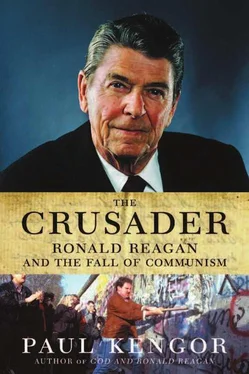When we signed the Consular Treaty with the Soviet Union, I think there were things that we could’ve asked in return: I think it would be very admirable if the Berlin Wall, which was built in direct contravention to a treaty, should disappear. I think this would be a step toward peace and toward self-determination for all people, if it were.
Here was possibly Reagan’s first public call for the removal of the Berlin Wall, offered in May 1967, twenty years before his famous plea to Mikhail Gorbachev.
Once the hour had passed, Chris Collingwood jumped in to mercifully stop the spectacle. Despite the unpleasant nature of many of the student interactions, Reagan had performed well—so well that his presidential boosters eventually sought to use clips from the debate during the 1968 Oregon primary, and requested a copy from CBS. Kennedy, however, reportedly did not want the video to be made available; CBS acceded to his request. 13Kennedy himself conceded defeat to Reagan, telling his aides after the debate to never again put him on the same stage with “that son-of-a-bitch.” Kennedy was heard to ask immediately after the debate, “Who the f___ got me into this?” 14
While the debate was a win for Reagan, he had other (more routine) engagements that addressed the Cold War during this time. In a speech in Albany, Oregon on November 11, 1967, Reagan spoke of the USSR as the “totalitarian force in the world [that] has made plain its goal of world domination.” As always, he said this was a goal that had been reiterated by Khrushchev and all present Soviet rulers—“Each one has stated they will not retreat one inch from the Marxian concept of a one-world socialist state.” America needed to “fight” that enemy. “If we have the courage to face reality, peace is not so difficult to come by. We can have peace by morning if we do not mind the price.”
The price, however, was an impediment; Reagan questioned America’s will: “Why are we so reluctant to do this? Because there is a price we will not pay.” He pointed to the Soviet tanks that crushed the Hungarian uprising in 1956, and the “echoes” of those who then cried: “People of the civilized world, in the name of liberty and solidarity, we are asking your help…. Listen to our cry.” 15
Reagan’s words that day were revealing of his Cold War intentions. He continued: We cannot bring peace “by simply refusing to fight.” It was “the height of folly” to believe “that we can end the Cold War simply by convincing the enemy of our good intentions.” He asked: “How many nations have backed down the road of good intentions to end up against a wall of no retreat with the only choice to fight or surrender?” He recalled the “sorry” example of Neville Chamberlain. He insisted that America could not “safely rest the case of freedom with the United Nations.” 16No, that was America’s job.
These were strong words. It might have served Reagan well to make clear to his critics that choosing to “fight” did not mean that he favored armed aggression against the USSR. He did not make that clarification, probably because he felt it was unnecessary to do so; he did not want to nuke or invade the Soviet Union.
A few months later, in May and June 1968, Reagan made a number of historically important statements that likewise have somehow slipped through the cracks of history. In a May 21 speech in Miami, Reagan again, for the second time within a year, and nearly twenty years before his address at the Brandenburg Gate, talked about removing the Berlin Wall: “If Russia needs our wheat to satisfy the hunger of her people, it might be well to point out that wheat could be delivered easier if there were no Berlin Wall between us.” 17Here Reagan essentially suggested that the Lyndon B. Johnson administration, or an incoming administration, link U.S. wheat exports to a Soviet commitment to take down the wall. The very next day, in Cleveland, he again attacked the wall, denouncing “Khrushchev’s contemptuous raising of the wall around Berlin.” 18
With his travels enabling him to speak to a variety of audiences, these stops around the country proved valuable to Reagan. Not only did they enhance his campaigning skills and political recognition, but they also provided him with a forum to air his passions. Though Reagan had been speaking on these issues for more than twenty years, he had never done so as a politician. Speaking to disparate groups of individuals gave him a certain confidence that he would rely upon during his national campaigns in later years.
COMMUNISM KILLS THE KENNEDYS
Most intriguing were unrelated (and likewise forgotten) remarks made by Reagan two weeks later, on June 5, 1968. On that day, Bobby Kennedy was again an item for Reagan, though this time in a dreadful way that the governor could not have imagined in their debate a year earlier: Kennedy had just been assassinated.
Reagan was invited to talk about the tragedy on entertainer Joey Bishop’s television show. A rare transcript of his appearance is today held by Bill Clark, who, as Governor Reagan’s chief of staff, grabbed a copy after the show. When Reagan appointed Clark a judge in San Luis Obispo County in 1970, Clark placed the transcript in a box, where it remains four decades later. 19
Reagan spoke at length about Kennedy, the loss, and even offered spiritual advice on how to cope with the sadness. Kennedy, said Reagan, had been struck down in a “senseless” and “savage act.” “I am sure that all of us are praying not only for him but for his family and for those others who were so senselessly struck down also in the fusillade of bullets…. I believe we should go on praying, to the best of our ability, to ask for God’s mercy in what has happened to us.” The governor said there was a “pall” over his state of California, the state in which the shooting took place.
Particularly interesting was how the Cold Warrior found a way to direct the discussion to America’s real enemy: the USSR. Reagan noted that Kennedy’s killer, an Arab, committed the crime because of the senator’s support of Israel, specifically during the Six Day War that had occurred exactly one year earlier.
Indeed, we learned that the conflict was intentionally precipitated by the Kremlin, which concocted false intelligence reports about alleged Israeli troop movements. Moscow shared the phony information with Egypt and other Arab states for the explicit purpose of creating a military confrontation with Israel, which the Soviets believed would advance their broader foreign-policy interests in the Middle East and the world. 20The shameless maneuver started a war, and was more evil than Machiavellian. It stands as one of the Soviet Union’s most egregious international crimes.
Ronald Reagan knew this. As a result, he linked—not unreasonably—Bobby Kennedy’s assassination to the USSR. “The enemy sits in Moscow,” he told Joey Bishop. “I call him an enemy because I believe he has proven this, by deed, in the Middle East. The actions of the enemy led to and precipitated the tragedy of last night.” Moscow had precipitated the Six Day War, which, in turn, had prompted RFK’s assassin. Reagan’s next words matched precisely those of his first presidential press conference thirteen years later: That same Soviet power, he said, believed that “the end justifies the means” and that “there is no morality except that which furthers [its] cause.”
Although this take on Bobby Kennedy’s assassination has not been popular historically, there was justification for it and as such Ronald Reagan did not shy from it. As he would display frequently during his political career, he was unwilling to let the threat of criticism deter him from voicing his quite strong opinions. To Reagan, Robert Kennedy’s assassination was a cautionary tale, one that offered a very real sense of the evils that Communism inevitably leads to if allowed to flourish.
Читать дальше












